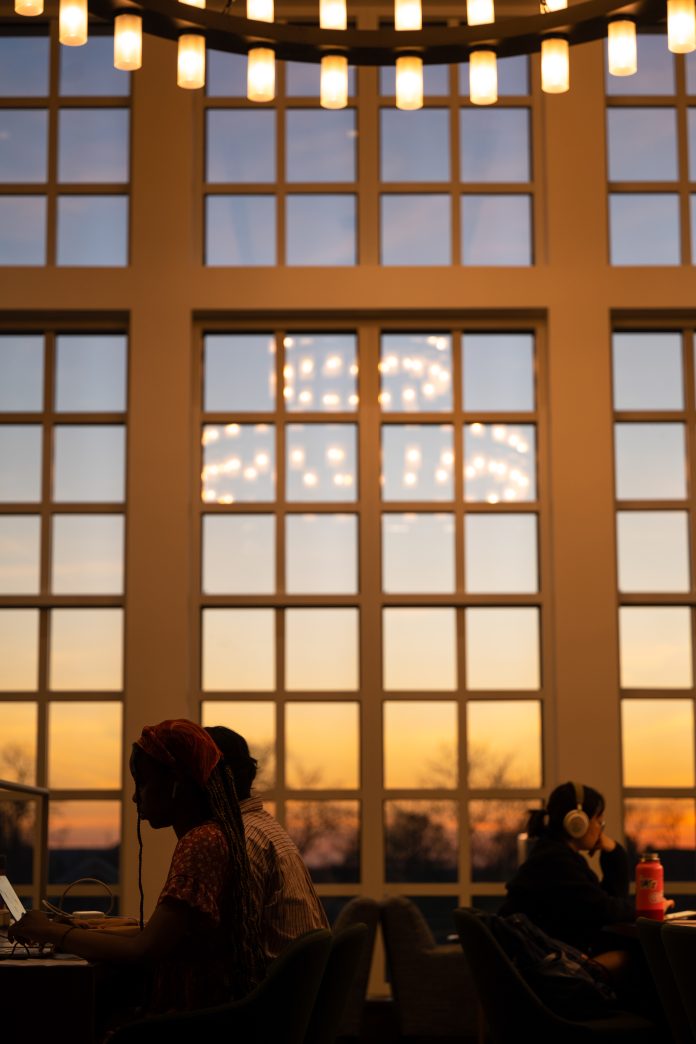
On Monday, April 7, DePauw faculty members met on Zoom to discuss several academic and institutional topics. The meeting featured wide-ranging conversations about academic freedom, international student safety and DePauw’s response to national political issues, as well as updates on curriculum language revisions.
Faculty Raise Concerns Over National Politics
The meeting addressed concerns about DePauw’s response to national political developments, particularly regarding academic freedom, international student safety and proposed state and federal education regulations.
Philosophy Professor Erik Wielenberg reported on recent updates from the Strategic Planning Committee, noting that DePauw has so far taken a “wait-and-see” approach in response to national legislation. No policy changes have been made, but faculty have received clarification on existing positions. Professor Wielenberg noted that committee concerns were largely about potential government interference in university operations.
Vice President of Academic Affairs Dave Berque read a statement from President Lori White, who was unable to attend the meeting due to traffic delay. Her remarks reaffirmed DePauw’s commitment to academic freedom and acknowledged threats posed by executive orders aimed at higher education and international students. She emphasized the need for clear, consistent communication of the university’s values, especially as universities face heightened political and legislative pressures.
The president’s statement acknowledged concerns among faculty and students regarding safety, visa policies and the broader challenges facing international travel. She outlined support efforts, including a subgroup on immigration concerns co-chaired by Berque, Vice President for Enrollment Management Beth Petrie and Vice President for Student Affairs John Mark Day. Although President White reassured the community that DePauw has not been directly affected by recent federal actions, some faculty members called for clearer commitments to students’ safety.
Professor Cameron criticized what he saw as overly optimistic messaging around campus safety, arguing that restrictions on free speech are already emerging at institutions across the country. “We cannot honestly say we can protect international students in this climate,” he said, questioning whether DePauw is prepared to offer legal support to students or faculty targeted for their speech or status.
Beth Petrie responded that admissions does not overpromise safety, instead focusing on communicating DePauw’s values and support networks. “We demonstrate the kind of caring community we are,” she said, “without making promises that are beyond our control.”
Amendments to Curriculum’s Language Use
The meeting also addressed a second motion from the Curricular Policy and Planning Committee (CPPC) to revise the language in DePauw’s description of graduation requirements. After a year-long process of drafts, open meetings, student input and a campus-wide survey, the committee brought a final version forward for approval.
The most visible change is replacing “Extended Studies” with the more widely understood term “Extensions.” According to Chemistry Professor Richard Martoglio, the revisions were based on community feedback, including responses from 147 students and 66 faculty as well as staff. The goal, added Biology Professor Henning Schneider, was to make the language clearer and more accessible for students navigating their degree requirements.
However, debate arose over the phrase “Exploratory Foundations,” a term describing DePauw’s general education courses. Some faculty felt it was vague or too abstract. Professor Rebecca Schindler from the Classical Studies Department offered a friendly amendment to revise a sentence containing the phrase, arguing that the words “intentional” and “supportive” were unclear. Her suggested revision— “Exploratory Foundations introduce students to a broad range of academic subjects”— was designed to bring clarity.
While several faculty members supported Schindler’s revision, others challenged the term “Exploratory Foundations” altogether. Philosophy Professor Rich Cameron proposed renaming it “Foundations for Exploration,” claiming the new term sounded more natural and better represented the purposes of foundation courses.
That broader amendment failed, with 81% voting no. Faculty moved forward with the original revised draft.
Additional Committee Updates
- Strategic Planning: Faculty continue to monitor legislative actions but have not yet seen formal policy changes at DePauw. Open budget discussions are scheduled for April 22.
- Faculty Governance: Updates to the handbook reflect the transition from the School of Music to the Institute of Music and clarify who convenes meetings when no chair is available.
- Creative Writing Renaming: The English Writing program will now be called Creative Writing, while faculty members discussed how to ensure journalism and news writing courses retain a defined academic home.
- Diversity & Faculty Evaluation: Faculty expressed concern over DEI-related language in tenure and promotion guidelines. The Faculty Personnel Policy and Review Committee is reviewing how to retain core values in a changing political environment.
- Student Academic Life (SAL): Members requested clearer administrative guidance regarding international student safety, especially in light of increased concerns during advising from April 14th to April 17th.
